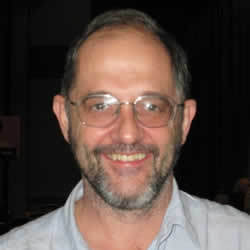This long story is relevant to the concept of enjoying the foibles of oldies playing bridge, rather than being irritated by the unusual nature of the overlap between club bridge and aged care.
Fifteen years ago I directed at a bridge club where Norma played. Norma found 28 husbands and relatives who wanted to learn bridge. Norma asked the legendary Sydneysider John Roberts to teach them. For this unusual group where about 20 had played social bridge and only 8 were relatively new to the game, John's method of teaching was that all the 7 tables simply played bridge (duplicate style, to some extent) with John attending to the 2 tables of newbies, with the other 20 players instructed to put their hand up and ask questions whenever they liked, learning bridge from John's answers.
While I directed the duplicate game in the next room, I dropped in to see John in action.
Ralph asked: "Am I allowed to grimace and signal to my partner with my body language?"
"An excellent question," John replied. "When I was a teenager in the 1970s, my first game of duplicate bridge was at Peninsula Bridge Club. Halfway through, we had to wait for an old couple to finish their previous three boards. As we sat down, a gent who looked about 90 years old said: "Nice to see you again." I was a bit bewildered, having never seen him before, but said Hi in reply. I was dealer and passed. The old gent was still sorting his cards - finally he had all 13 cards in his hand and said aloud:
"1, 3, 7, 8, 11, 13, 14, 16. One no trump, partner, one no trump I bid."
My partner passed, RHO bid 3NT. Dummy had 10 points, I had 10 points - by subtracting 16, 10 and 10 from 40, I strongly suspected partner had 4 points. The defence was a bit easier than usual. On the second board, the rigmarole continued "3, 6, 7, that's all, partner, I pass." My partner played the hand as if he could see through the back of the cards. We didn't have time to play the third board because the old gent took so long - the Director came up and said "60% for East West, please move now" and we went to the next table.
After the game finished, I (young John) asked the Director John Verhulst: "Is that old gent allowed to tell his partner how many points he has?" JV interrupted his manual scoring of the duplicate game and gave me his full attention.
"See this book of Laws of Bridge, young John. It prohibits any communication between partners except for their actual bids and plays made. No grimaces ever, no smiles until the hand is over. So of course the old gent is breaking the rules. But bridge is better than that. Bridge is a game where the etiquette is paramount - we all love our twenty minutes at the old gent's table, where chaos ensues. He cannot help saying his points out loud, but there are two of us opponents, taking full advantage by calculating everyone's exact point count as soon as we see dummy. It's not quite bridge, but we love it. It's a level playing field for all of us. Sure, he is breaking the rules, but do you insist I take some action to make him follow the rules, young John?"
"I get it. You can get back to your scoring. Thanks for taking the time to educate me," young John replied.
John Verhulst resumed his scoring but still said to me: "Young John, we can even work out which combinations like a jack and a king he has if we listen closely enough to him saying 1 then 3. And that 60% score I gave you - many of his opponents have to miss playing a board, so I always give them a minimum score of 60% on the board they miss. I hope you will come back to this bridge club."
John Roberts came back to Peninsula many times, before graduating to winning National Championships and the like. And it's worth pointing out how much the 28 people gently learnt about bridge from that story - the number of points for 1NT, 26 points for 3NT, drawing deductions etc.
More than 40 years later, Peninsula Bridge Club has grown from 360 members in 2012 to 552 members in 2018. Ref the 10th listed club on page 8 of
http://www.abfevents.com.au/files/bulletins/not2019/07Tue15.pdf.
My point is that clubs where the staff have the right attitude to oldies will succeed.
Mary Hogg and I used to joke that in the bridge world, those under 90 are the juniors, and the juniors should help take care of the seniors (those over 90), giving them lifts to the bridge club and so forth.
Printed with permission from Peter (one of Australia's top players) from a post on 31 Jan 2019 on BridgeWinners.com.
